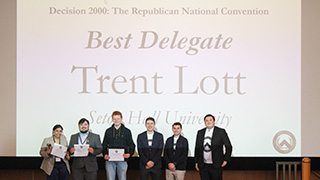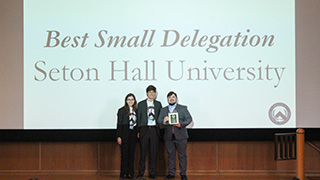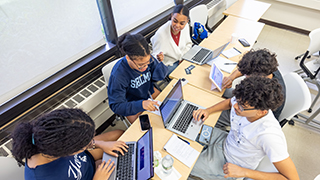Seton Hall United Nations Association's (SHUNA) Success at Princeton Diplomatic Invitational
Friday, May 3, 2024

Best Delegate Awards went to Seton Hall students, Sophia Alicea and Joseph Brennan.
From April 4 to 7, the Seton Hall United Nations Association (SHUNA), the university's competitive Model UN (MUN) team, competed at the Princeton Diplomatic Invitational (PDI). PDI is hosted by Princeton’s larger International Relations Council. The team sent a five-person delegation to the conference, who competed among four different committees. The delegation featured one senior, three sophomores, and one freshman. The team worked hard all weekend, resulting in all five delegates winning individual awards and the team as a whole winning the Best Small Delegation Award. Individually, Best Delegate awards were given to Sophia Alicea and Joseph Brennan, Outstanding Delegate awards went to Riley Macneir and Dillon Kantor, and Connor Campbell received an Honorable Mention award.
The delegates from Seton Hall agreed that PDI was a wonderful experience. Riley Macneir explains, "it was an amazing experience building skills, partnerships, and resolutions. PDI could not have been a better experience."
This was PDI’s first in-person conference since the COVID-19 pandemic. The four-day event featured nine committees, four of which included SHUNA delegates. The committees included the Republican National Convention, 2000; The Colombia-FARC Peace Accords, 2016; Abolition of the Caliphate, 1924; and The Restored Government of Virginia, 1861-63. All of this year’s PDI committees were crisis-focused, which entails creative arc- and relationship-building with delegates from other schools.
Beyond the committee sessions, PDI offered several guest speaker events. These guest speakers were relevant to each committee, sharing insights into the topics of the weekend and assisting delegates with debate and research. Further, PDI offered a philanthropy program to benefit the Trenton Area Soup Kitchen (TASK) through donations and candygrams. TASK is a local non-profit that fights hunger and aids residents in achieving self-sufficiency. The group provides meals to those in need and offers programs and services to empower individuals and improve their quality of life.

Seton Hall was also recognized with the award for Best Small Delegation.
Model UN Crisis Committees simulate real-time decision-making in emergencies. Scenarios unfold with constant updates, forcing delegates to think and react quickly on their feet. Unlike traditional MUN committees with a set agenda, crisis committees can take unexpected turns, requiring delegates to adapt their strategies and alliances throughout the conference. This fast-paced environment keeps participants engaged and tests their ability to think creatively under pressure. Delegates in Crisis Committees may represent not just countries, but also non-state actors like influential NGOs or rebel groups. They might even take on the role of news reporters tasked with covering a crisis, or fictional characters within the scenario itself.
This departure from traditional country representation allows students to explore international relations from a wider perspective. Understanding the motivations and goals of non-state actors can be just as important as understanding the positions of countries in navigating real-world crises. Crisis Committees often have a less formal structure than traditional Model UN committees. This informality allows for more strategic maneuvering and backroom tactics. Delegates can forge alliances with other delegates based on shared interests or even engage in secret backroom deals. Crisis committees reward creativity and strategic thinking, as delegates look for innovative ways to influence the course of the crisis and achieve their objectives.
SHUNA travels to different conferences across the country, this year, notably attending McMUN at McGill University in Montreal, NCSC in Washington, D.C. which is hosted by Georgetown, and PDI. SHUNA would like to thank both Seton Hall Student Government Association and Seton Hall’s School of Diplomacy and International Relations for supporting the organization’s travels and endeavors.
Categories: Nation and World






